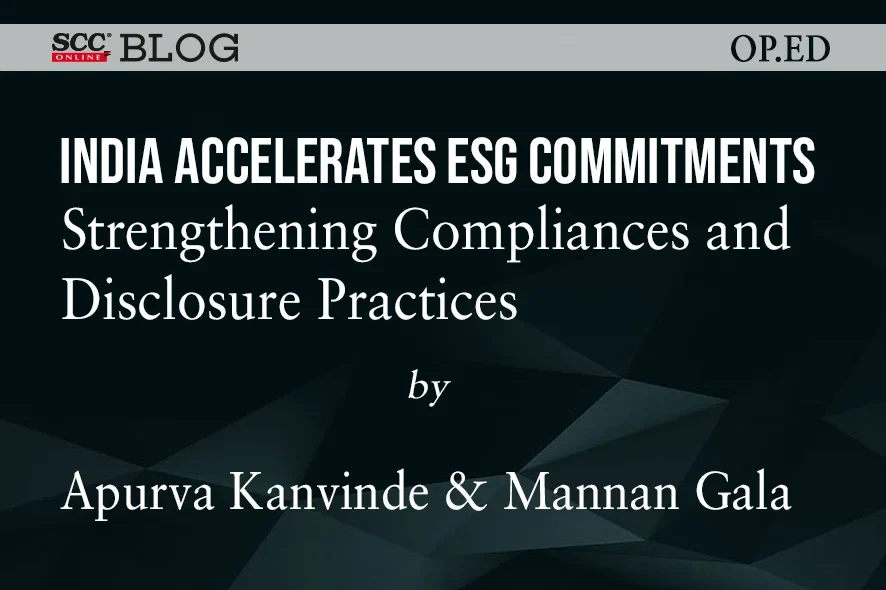India’s business community must now adhere to the additional compliances and disclosures around environmental, social and governance (ESG) published by India’s Securities and Exchange Board (SEBI). SEBI at its Board meeting held on 29-3-20231, approved the more comprehensive and assurance-oriented Business Responsibility and Sustainability Reporting Core model (BRSR Core), which will be effective for the top 250 listed companies (by market capitalisation) from the next financial year. These policies are being implemented by SEBI pursuant to and in consonance with the consultation paper released by SEBI on ESG Disclosures, Ratings and Investing2 (Consultation Paper). The BRSR Core comprises of key performance indicators (KPIs) under the E, S and G attributes for reasonable assurance. Some of the KPIs identified by the ESG Advisory Committee are pertaining to the change in water footprint, enabling gender diversity in business, change in greenhouse gas footprint, enhancing employee well-being and safety, etc.
Impact on supply chains and small players
While the new framework for ESG disclosures will primarily apply to the top 150 listed companies (by market capitalisation) in FY 2023-2024 and to the top 250 listed companies (by market capitalisation) from FY 2024-2025, according to key industry players, its effects will cascade down to the upstream value chain involving thousands of smaller enterprises, supplementary businesses, and third parties.
Moreover, it shall be noted that the ESG footprints of a company’s supply chain are increasingly important to investors who want a complete picture of the ESG risks and impact associated with the company’s products and services. However, ESG disclosures for supply chain can be complex, especially for companies with multiple tiers of suppliers or small, unlisted supply chain partners. Therefore, listed companies would need to support their supply chain companies to develop processes, to train, and collect data for ESG disclosures. SEBI addresses this by introducing a limited set of ESG disclosures with certain thresholds, in the BRSR Core, proposed to be gradually introduced on a “comply or explain” basis. This will allow companies to report on a voluntary basis and provide investors with a complete picture of ESG risks and impact associated with their supply chain. According to the Consultation Paper, ESG investing funds will now face a tighter portfolio and stewardship criteria, aimed at transparency and addressing greenwashing risks.
Dual ESG ratings for Indian and global investors
Companies may practise giving non-financial disclosures after each quarter instead of year end. The new model of BRSR Core will gradually extend to the top 1000 listed entities by FY 2026-20273, while SEBI already mandated the previous framework of BRSR for the top 1000 listed companies.4 Accordingly, the BRSR would be updated to incorporate the KPIs that have been proposed in the BRSR Core.
Industry experts believe that companies may extend two different ESG ratings, one based on Indian standards and the other for global investors. This way, companies will not be restricted from being ranked on global standards and have a chance of attracting increased investments. As such, the new BRSR Core model is relevant to both the manufacturing and service sectors and focuses on India specific parameters and targets. Hence two different ESG ratings to cater to different requirements of investors.
ESG ratings on assured indicators
The Consultation Paper further states that ESG ratings are typically awarded solely on corporates’ own self-reported data, without any independent verification of such data. SEBI has expressed concerns about the activities of unregulated ESG rating providers (ERPs) which may lead to larger concerns about issues of investor protection, market efficiency, risk pricing, capital allocation and greenwashing. It is therefore, suggested that ERPs give a core ESG rating based on information that is assured, validated, and audited in light of the proposed BRSR Core model and disclosures of assured KPIs.
ESG focus on social standards and gender diversity
There has been a paradigm shift wherein companies are not only looking at environmental compliances, but also focusing on social and governance compliances as induced by the new elaborate ESG regimen.
A significant change that is being felt on the social standards, is seen where assurances have been mandated regarding spending on measures towards the well-being of employees, safety-related incidents, working hours, and gross wages paid to women as a percentage of total wages, among others. The new disclosures require more transparency on gender diversity claims. A new section has been introduced in disclosures specific to policies for employee training and welfare, safety, and more detailed data collating on the number of permanent versus contract employees, differently abled employees, and others (as specified in Annexure 1 of the Consultation Paper).
Conclusion
The new ESG disclosure framework requires companies to provide assurance on greenhouse gas emissions, water wastage, consumption and treatment, waste management, and other environment-related disclosures. A new detailed format will require collecting ESG-related information at each sale and purchase order level, especially for manufacturing companies. Moreover, as the new model focuses on India specific parameters and targets, industry experts feel companies may extend two different ESG ratings catering to different investor requirements.
In conclusion, India must prepare to comply with the evolving standards around ESG compliances. The new ESG disclosure framework will require companies to provide reasonable assurance on various environment-related disclosures and employee well-being, among others, adhere to tighter disclosure norms and increasing corporate governance standards to meet the global/international standards. Companies that successfully comply with the new framework’s standards will have an advantage in attracting global investors and building a sustainable future.
† Partner, Capital Markets & Securities, Juris Corp, Mumbai, Maharashtra. Author can be reached at apurva.kanvinde@jclex.com.
†† Associate, Juris Corp, Mumbai, Maharashtra. Author can be reached at mannan.gala@jclex.com.
1. Securities and Exchange Board of India, SEBI Board Meeting (2023), available at <https://www.sebi.gov.in/media/press-releases/mar-2023/sebi-board-meeting_69552.html>.
2. Securities and Exchange Board of India, Consultation Paper on ESG Disclosures, Ratings and Investing (2023) available at <https://www.sebi.gov.in/reports-and-statistics/reports/feb-2023/consultation-paper-on-esg-disclosures-ratings-and-investing_68193.html>.
3. Securities and Exchange Board of India, SEBI Board Meeting (2023) available at <https://www.sebi.gov.in/media/press-releases/mar-2023/sebi-board-meeting_69552.html>.
4. Securities and Exchange Board of India vide Circular No. SEBI/HO/CFD/CMD-2/P/CIR/2021/562 dated 10-5-2021 <https://www.sebi.gov.in/legal/circulars/may-2021/business-responsibility-and-sustainability-reporting-by-listed-entities_50096.html>.






